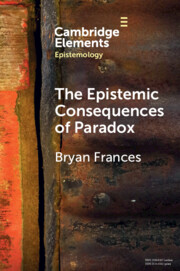Element contents
The Epistemic Consequences of Paradox
Published online by Cambridge University Press: 30 June 2022
Summary
- Type
- Element
- Information
- Series: Elements in EpistemologyOnline ISBN: 9781009052948Publisher: Cambridge University PressPrint publication: 28 July 2022
References
- 13
- Cited by

